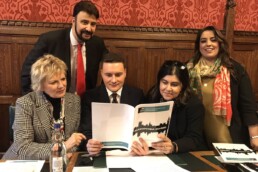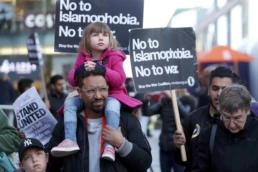In order to meaningfully discuss the ‘black experience’ in British Muslim spaces, there are a few things that we need to consider. There are many things to unpick, a few of which I attempt here:
1. Communities in the UK often characterised as religious are in fact ethno-cultural; an ethno-cultural community is one that believes it’s ethnically or culturally distinct from other groups. In what way? In its cultural practice, tradition, solidarity, and (can include) religious outlook. If these Muslim communities are in fact ethno-cultural, which ethnicity predominantly? The statistics show that the vast majority of ‘Muslim’ communities across England strongly identify as South Asian, where Islam is an aspect of their South Asian cultural heritage. (I refer to a broad South Asian characterisation here merely because the sub-cultures are similar and exhibit a greater level of solidarity to one another than to others, and I also distinguish between believers of Asian-heritage and those who primarily identify as South Asian with a deep commitment to cultural values.) This has led to the widespread conflation amongst Muslims and non-Muslims that ‘Muslim’ and ‘Asian’ are synonymous. This false conflation allows for:
(a) the perpetuation of the ‘black experience’ in communal ethnic spaces to be seen as a ‘Muslim’ problem when they’re not: “Muslim communities are racist…”, and
(b) misleads racialised ‘black’ (and other non-Asian) believers into seeking a sense of belonging with ethnic communities inaccurately taking them to be faith-based ones.
What many people overlook is that the ‘black experience’ of believers is often far more pronounced in South Asian spaces (due to its conflation with being a Muslim space) than wider society and many will affirm that the first time they experience overt racism and/or prejudice is amongst South Asian Muslims. Now if wider anti-Black prejudice affects the opportunities of the
marginalised, then prejudice and marginalisation faced by racialised believers that affects their faith is even more problematic, and that’s my interest here.
The impact of ethnic motivations on ‘Muslim spaces’ has resulted in the following:
- ‘Muslim spaces’ are highly racialised as South Asians tend to have a strong sense of ethnic identity in comparison to others. For a mundane example, “Where are you from?” is the opener for most conversations.
- Just like ‘white’ is viewed as normative in wider discourse, South Asian customs and attitudes acquire a presumed normativeness around all things ‘Muslim’. The culturally insular nature of South Asian communities also means that in reality, Muslim spaces are firstly South Asian spaces. I am not problematising this (as it’s somewhat inevitable) but it’s important to recognise for the purposes of these posts. Under these circumstances, when issues such as ‘Muslim unity’ is raised, what is meant de facto is an accord centred around South Asian norms, values, interests and approaches – both social and political, and in most situations the promotion of unity and/or the empty platitudes of “Islamic” utopianism merely maintain a (usually South Asian) ethnic dominance of the Muslim narrative, along with immigrant interests. To a far lesser extent this also happens in non-Asian communities that present a normativeness based in a historically and culturally specific ‘Immigrant Islam’.
- In the public realm, ‘Islam’ and ‘Muslim’ is highly politicised both by Muslims and non-Muslims. Due to their own misperception that merges ethno-cultural commitments and religion, they identify as Muslims through the lens of multiculturalism adopting a secular expression of Islam to maintain their interests under political liberalism.
2. Keeping these brief points in mind we must recognise then that the unity and sense of belonging many believers seek is not to be found in this context. It is a misplaced aspiration and one based on a mythical notion of sameness. The uncomfortable reality is that we all don’t share significant capital. So whilst one may support local Gujrati and Turkish communities in the preservation of their civic rights just as he would other ethno-religious groups, he’s wholly conscious that he’s not a member of their respective ethnic communities and that their mosques, schools and cultural Muslim centres exist to serve their own ethnic groups, of which he’s not a member. They may kindly permit him to use their facilities for salah at specific times (many kind Christians have also welcomed Muslims to use their facilities), but he’s not lulled into a false sense of belonging and/or community. One may acknowledge that in many situations, it’s not that they have sought to actively marginalise those unlike them but to maintain the dominance of their own cultures in the spaces they consider to be theirs.
Unfortunately, many ‘outsiders’ are easily caught up with superficial claims of unity and/or sameness, but the existence of these communities isn’t premised on faith as the overarching identity – faith is subsumed under the greater umbrella of their own ethnicity. This of course does not justify racism and colourism that may emanate from these ethnic communities, but we need to
acknowledge that these spaces simply aren’t for us, and never were they meant to be. To expect shared religious and cultural capital with those from intensely insular ethnic communities is highly misplaced. And the reason much of this is not said, although intuitively acknowledged by most, is because ‘outsiders’ are reticent of being charged with ‘disuniting’ Muslims, and many of these communities are apprehensive of exposing the reality of their ethnic commitments and allegiances.
3. Now to be clear, my point isn’t that racism/colourism doesn’t exist in such spaces, but that we need to unpick racism from ethnic preservation – is it ‘Muslims’ being racist, or South Asian’s preserving their ethnic identity which happens to include religious practices? From a point of faith-based interests in the UK both are problematic, but for very separate reasons. For a case study of this conflation: there are complaints of the ubiquity of Urdu in communal Muslim spaces such as Asian mosques or seminaries with the accusation that this marginalises non-Asians, but we fail to realise that these spaces principally exist to promote distinct cultural values and (subcontinental) Asian Islam. Even where the argument is made that it’s about denominational commitments such as Deobandism or Barelvism and not ethnicity, the reality is that these are specifically ‘ethnic’ denominations and modes of thinking vis-a-vis the Asian immigrant experience. In real life this is borne out: neither do Deobandis nor Barelvis seem to envisage non-Asians converting to their denominations, nor do cultural ‘outsiders’ on the whole find these denominations particularly compelling or enticing.
4. In the interests of fairness we must be nuanced. Anti-Blackness is deeply entrenched in many structures and cultures so we ought to acknowledge that many people do not know how to recognise anti-Blackness and its various manifestations, nor have they lent a conscious thought to the ways in which they might subconsciously hold racist views that contribute to the ‘black experience’. Whilst it is true that we cannot hold all racial offenses of all people to be intentionally racist (whether they’re South Asian, ‘White’, or whatever), we can hold them to account when it’s brought to their attention, and current events afford us even less of an excuse. As many have witnessed, often there is a strong resistance to change which exposes how deeply entrenched racism is. Some of the following act to impede change:
- ‘Asian fragility’: a profound sensitivity around highlighting racism or prejudice within Asian communities, often dismissed or deflected onto older members: “It’s only the older generation.” And the preoccupation with maintaining a positive view of ethnic-self means that there’s a white-washing of the past and little resolve to consider it, namely the impact Hindu heritage has had (such as the Indian caste system) on their current norms and values.
- Hypocrisy: Many South Asian communities will criticise ‘whites’ for their racism, even joining the movement against anti-Blackness but then do exactly what they accuse ‘whites’ of. Aside from whitewashing their past, many will refuse to speak out or challenge wildly racist sentiments in their own communities whilst expecting ‘whites’ in the same situation to do so. Many will acknowledge the structural racism in their institutions yet remain committed to upholding those structures whilst denouncing others for not tearing theirs down. Many underplay anti-Black microaggressions whilst protesting the same microaggressions in wider society when perpetuated against them.
- Either a complete denial of racism such as “I’ve never seen it/we don’t think we’re superior”, or an absurd counterclaim based on a generalisation that isn’t even made: “You’re a racist for calling us racist.”
- Justification with even more racism: “We’re not anti-Black, but Blacks do commit more crime…”, or “You just sound angry” feeding into the Angry Black Man/Woman trope.
- False retorts: “You’re calling us racist just because we won’t let you marry our daughters” when the anti-blackness goes far beyond denying marriage.
- Whataboutery: “But what about [insert another ethnic group]?”
5. The complexities of social change means that because so many distinct variables are interrelated that to change one significant thing can necessitate rethinking the entire structure. In the next post I discuss what I mean by this. It is easy to say that we simply need to inform Muslims about “what Islam says” since what it means to be a Muslim as well as our views on
subservience to God and what it necessitates across the board can wildly differ. Furthermore, we assume that simply making people aware of their implicit biases will change them, but there’s a lot to suggest that it doesn’t work like that. So what to do? In the next post I discuss possible answers and certain realities.




